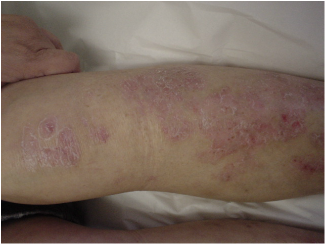Eczema and Psoriasis

Autoimmune skin conditions such as Eczema and Psoriasis can have a huge impact on a person’s life. As many people who suffer from these conditions know, they are very hard to treat both in allopathic and holistic medicine alike. This is because these skin conditions progress through cycles and are constantly changing. In chinese medicine we work with patients treating each stage differently according to symptoms presented at each treatment.
When using Chinese Medicine to treat disease and its processes, especially in the treatment of autoimmune disease, it is very important to have the cooperation of the patient to make the necessary and recommended lifestyle changes. These lifestyle changes are most often made up of adequately dealing with stress, and eating or not eating certain foods. Stress can be a very complicated issue and cannot be sufficiently addressed here. In general adequate sleep, meditation and exercise are proven to be important in decreasing stress. There are a few simple basics that one can follow when it comes to eating proper foods.
Eczema and Psoriasis both go through inflammatory stages. This is seen in the presentation of red, itchy skin lesions that can be either wet or dry. In addition, Chinese medicine says regardless of presentation there is always the presence of dampness in these skin conditions, particularly in Eczema. This can be translated as retained pathological fluids and can be seen in the presentation of swelling of the skin, weeping skin lesions, or pustules under the skin. Lastly what Chinese medicine calls “wind” or itchiness is often present in these skin diseases both in wet and dry presentations. This is due either from insufficient quality of blood which is not nourishing the skin and leading to dryness, or from insufficient circulation of blood which is again not nourishing the skin. The root of this is often poor nutrition or poor absorption.
Certain foods that exacerbate such presentations include
Inflammatory foods
What to include into diet
Anti-inflammatory foods
When using Chinese Medicine to treat disease and its processes, especially in the treatment of autoimmune disease, it is very important to have the cooperation of the patient to make the necessary and recommended lifestyle changes. These lifestyle changes are most often made up of adequately dealing with stress, and eating or not eating certain foods. Stress can be a very complicated issue and cannot be sufficiently addressed here. In general adequate sleep, meditation and exercise are proven to be important in decreasing stress. There are a few simple basics that one can follow when it comes to eating proper foods.
Eczema and Psoriasis both go through inflammatory stages. This is seen in the presentation of red, itchy skin lesions that can be either wet or dry. In addition, Chinese medicine says regardless of presentation there is always the presence of dampness in these skin conditions, particularly in Eczema. This can be translated as retained pathological fluids and can be seen in the presentation of swelling of the skin, weeping skin lesions, or pustules under the skin. Lastly what Chinese medicine calls “wind” or itchiness is often present in these skin diseases both in wet and dry presentations. This is due either from insufficient quality of blood which is not nourishing the skin and leading to dryness, or from insufficient circulation of blood which is again not nourishing the skin. The root of this is often poor nutrition or poor absorption.
Certain foods that exacerbate such presentations include
Inflammatory foods
- Nightshades- tomatoes, potatoes, eggplant and peppers
- Alcohol
- Sugar
- Citrus
- Coffee
- Wheat
- Excess Dairy
- Sugar
- Fried foods
- Raw Fruits and Vegetables
- Iced Beverages and Cold Foods
What to include into diet
Anti-inflammatory foods
- Fatty fish such as Mackerel, Salmon, Carp, Catfish, Black Cod, Sardines and Herring
- Walnuts, Freshly Ground Flaxseeds, Pumpkin Seeds, Chia and Hemp Seeds
- Raw Butter, Ghee or Clarified Butter, Eggs particularly the yolk
- Evening Primrose Oil
- Omega-3 Fatty Acids (I like Green Pastures fermented Cod Liver Oil which contains balanced Omega 3,6,9, Vitamin A and D, Nordic Naturals is another quality fish oil)
- Turmeric both as a spice and in supplement form
- Probiotics ( Jarro-Dopholis, VSL #3 prescription strength lactobacillus available without prescription, Prescript-Assist soil based probiotics)
- Bone Broth made with Beef, Chicken, or Pork Marrow Bones, or Chicken Feet
- Exposure to UV light for Vitamin D
- Bok Choy
- Swiss Chard
- Kale
- Spinach
- Collard Greens
- Broccoli, Broccoli Rabe or Rapini
- Dandelions
- Asparagus
- Artichoke
- Watercress
- Fermented Vegetables- Sauerkraut and Sauerkraut Juice, Kimchi, Beet Kvass
- Burdock Root
- Yellow Dock Root
